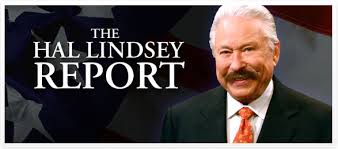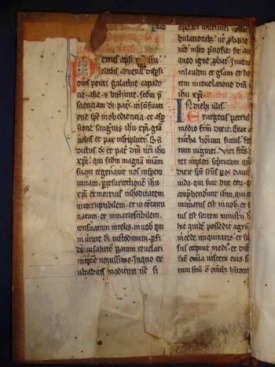Living in Light of Two Ages
____________________________
Entries from November 1, 2014 - November 30, 2014
Explaining the Book of Revelation by Treating It as Fiction
 Friday, November 28, 2014 at 12:16PM
Friday, November 28, 2014 at 12:16PM  It used to be the case that dispensational prophecy writers attempted to justify their unique interpretation of the prophetic portions of the Bible, by correlating current events with relevant biblical passages. Dispensational prophecy experts possess an uncanny ability to deftly explain the most consequential events in the evening news or morning headline on Drudge, as enabled by their distinctive system of biblical interpretation. Every natural disaster, war, or plague, can be used to prove the Rapture is near. This gives the Bible relevance, we are told, and it also proves that the dispensational understanding of the Bible is the correct one. The Bible predicts and explains current events.
It used to be the case that dispensational prophecy writers attempted to justify their unique interpretation of the prophetic portions of the Bible, by correlating current events with relevant biblical passages. Dispensational prophecy experts possess an uncanny ability to deftly explain the most consequential events in the evening news or morning headline on Drudge, as enabled by their distinctive system of biblical interpretation. Every natural disaster, war, or plague, can be used to prove the Rapture is near. This gives the Bible relevance, we are told, and it also proves that the dispensational understanding of the Bible is the correct one. The Bible predicts and explains current events.
Admittedly, the Book of Revelation is difficult to understand. The book is full of symbols, numbers, and references to both obscure and well-known prophecies from the Old Testament. Yet, dispensationalists have been quite eager to introduce, interpret, and explain this mysterious Book of Revelation to those interested in politics and world affairs, by claiming John's Apocalypse is "history written in advance."
According to the dispensational understanding of Revelation, the Apostle John is foretelling the terrible things to be unleashed upon the earth after the church is supposedly removed from the scene, at or near the beginning of the seven year tribulation period. Dispensationalists tell us that in Revelation 4:1, when John hears a voice saying "come up here," he is referring to the Rapture. Therefore, everything which follows in the Book of Revelation is an account of what will happen after the Antichrist makes a peace treaty with Israel, as the Gentile church (now raptured) awaits with the Lord his return from heaven.
Dispensationalists claim that they find all of this in the Book of Revelation, because they interpret the book "literally," while the dreaded amillennarians (like me) "spiritualize" Bible prophecy, enabling us to explain away the otherwise obvious dispensational interpretation of the Book of Revelation.
Over the course of my adult life, this was a debate both sides (dispenationalists and amillennarians) thought worth having. In fact, I'm still engaged in it.
So, you can imagine my surprise when I ran across a recent interview with Dr. David Jeremiah, the well-known dispensational writer and pastoral successor to Tim LaHaye (Interview with Dr. David Jeremiah). In discussing his newest book, Agents of the Apocalypse, Dr. Jeremiah offers a very surprising justification for introducing fictional characters into a book explaining the meaning of Revelation to the American masses.
Dr. Jeremiah tells the interviewer,
"We took 10 characters from the Book of Revelation and told the story of that book built around those individual characters or groups of characters and we introduced every chapter with a fictional element that drives this down into the hearts of people," the California megachurch pastor explained. "It's really been fun to see how it's opened up this book (Revelation) to so many people."
The characters and groups that begin each chapter of Agents of the Apocalypse, published in October, include "The Exile," "The Martyrs," "The Two Witnesses," "The Dragon," "The King," and several others, including the two "beasts," one from the sea and another from the earth.
Dr. Jeremiah contends that the best way to explain the Book of Revelation is by introducing fictional characters so as to "drive the message down into the hearts of people," and to open this book (Revelation) "to so many people." I'm surprised at Dr. Jeremiah's justification for doing this because I always thought that the heart of the defense for reading Revelation through a dispensational lens, is that biblical prophecy only makes sense when interpreted "literally."
Why would Dr. Jeremiah move from a popular-styled verse by verse exposition of the text, as dispensationalists have done for years, to introducing fictional characters to help us understand it better and drive its message home? I'm having trouble seeing the logic in this.
No doubt, the main reason is that the LaHaye/Jenkins Left Behind series paved the way for successive waves of Christian fiction focusing upon end times. Even the self-professed "Bible Answer Man," Hank Hanegraaff, jumped into the lucrative Christian fiction market with an anti-dispensational series of novels tied to the Fall of Jerusalem in A.D. 70 (The Last Disciple). The Left Behind novels were unashamedly marketed as Christian fiction, and although they were overtly dispensational in their theology, they were not offering commentary on a specific book of the Bible.
I get that Dr. Jeremiah is using fictional characters as a literary device to explain and articulate the dispensational reading of the Apocalypse. Yet does not this approach fly in the face of the long-standing dispensational presupposition that we must read the Book of Revelation literally to ensure that we do not spiritualize its meaning? How is the introduction of fictional characters not spiritualizing biblical prophecy? How is this not a serious undermining of the very reason why Dr. Jeremiah interprets Revelation as he does in the first place?
I guess I shouldn't be surprised that Tim LaHaye's successor, of all people, would be so unapologetic for using fictional characters to explain his "literal" understanding of biblical prophecy. Jeremiah adds,
"these are really cool characters that we created. Judas Christopher is the name we gave to the anti-Christ, the one who's going to come and take over control of the world. Damon Detherow is the false prophet who is his religious and economic czar."
When I think about it, giving the Antichrist and false prophet fictional names and seeing them as "cool characters" is but another way of doing what dispensationalists have always done--attempting to interpret the Bible in light of current events. But when there are not obvious candidates for the Antichrist and False Prophets in the evening news, why not just make up substitutes who do the same thing dispensationalists expect to happen at the time of the end?
I hope my dispensational friends can see the irony that we spiritualizing amillennarians strive to resist such efforts to explain Revelation through any means other than interpreting Scripture by Scripture (Harold Camping aside). We work from clear passages to harder texts. Striving to read the Book of Revelation through the broader lens of redemptive history, amillennarians believe the Book of Revelation is a divine commentary on those Old Testament prophecies which find their fulfillment in Christ at both his first and second advents. The key to interpreting the symbols in the Book of Revelation is to determine how they are used in the Old Testament. The apocalypse clearly reflects the already-not yet tension found throughout New Testament eschatology.
Fictional characters cannot help us understand this book--but real biblical characters (like those in the Old Testament) can. Shouldn't we turn to them first? Granted, some amillennarians have tied the Antichrist to current events and historical personages, such as the papacy during the Reformation and post-Reformation periods. Yet in most cases, Reformed writers avoid identifying a particular Pope as "the" Antichrist.
Many more have embraced the wise counsel of Geerhardus Vos, who warned Christians that there will be a number of end-times prophecies we simply cannot fully understand until they are fulfilled--but this will be at that time when the Lord returns, when all prophetic speculation is no longer an issue.
Using fictional characters to "explain" the Book of Revelation is the last thing I would expect a dispensationalist prophecy expert to do. I guess the times have changed. Fiction sells.
Friday Feature -- One Handed!
 Friday, November 28, 2014 at 07:19AM
Friday, November 28, 2014 at 07:19AM I don't know if this is the greatest catch I've ever seen, but it is up there!
Happy Thanksgiving!
 Thursday, November 27, 2014 at 07:22AM
Thursday, November 27, 2014 at 07:22AM  The Riddlebargers will celebrate Thanksgiving this year by attending Christ Reformed's annual Thanksgiving Service (led by Rev. Chris Coleman), and then we are off to my mother-in-law's house nearby for the traditional Thanksgiving fare.
The Riddlebargers will celebrate Thanksgiving this year by attending Christ Reformed's annual Thanksgiving Service (led by Rev. Chris Coleman), and then we are off to my mother-in-law's house nearby for the traditional Thanksgiving fare.
Lord willing, it will be a "nutribullet free" weekend of ham, turkey, dressing, pie, leftovers, and a massive tryptophan coma. Back to the nutribullet on Monday!
There is much for which to give thanks! Every Lord's Day we witness answers to prayer in our church family, my wife and I are well, my sons make us proud, and I continue to enjoy my work.
I wish you all a blessed Thanksgiving! As the Psalmist says (Psalm 107:1-9),
1 Oh give thanks to the Lord, for he is good, for his steadfast love endures forever!
2 Let the redeemed of the Lord say so, whom he has redeemed from trouble
3 and gathered in from the lands, from the east and from the west, from the north and from the south.
4 Some wandered in desert wastes, finding no way to a city to dwell in;
5 hungry and thirsty,their soul fainted within them.
6 Then they cried to the Lord in their trouble, and he delivered them from their distress.
7 He led them by a straight way till they reached a city to dwell in.
8 Let them thank the Lord for his steadfast love, for his wondrous works to the children of man!
9 For he satisfies the longing soul, and the hungry soul he fills with good things.
Hal Lindsey Celebrates his 85th Birthday -- But His Mustache Is Only 40
 Tuesday, November 25, 2014 at 10:20AM
Tuesday, November 25, 2014 at 10:20AM  End times prognosticator Hal Lindsey just celebrated his eighty-fifth birthday. Although his 1969 book Late Great Planet Earth was the first theology book I read on my own as a teenager, I have since moved far away from Lindsey's dispensational premillennialism.
End times prognosticator Hal Lindsey just celebrated his eighty-fifth birthday. Although his 1969 book Late Great Planet Earth was the first theology book I read on my own as a teenager, I have since moved far away from Lindsey's dispensational premillennialism.
While I am thankful that God has granted Mr. Lindsey long life and good health, I cannot help but wonder if Lindsey is surprised to have lived this long without seeing the Rapture.
One thing has always bothered me about Lindsey--besides his eschatology. The older he gets, the darker his mustache becomes. Men usually start to go grey at the chin, temples, and mustache in their late 40's. Indeed, Lindsey has a fine head of silver hair--the well-earned sign of long life. But his mustache is a whole generation younger than the rest of him!
One of the most popular posts in the history of this blog was "signs of the end" and the changing colors of Hal Lindsey's mustache (There Will Be Signs on the Earth). And so as we wish Mr. Lindsey a happy birthday, we wonder, if like the leaves changing color in the Fall, whether or not his mustache will grow old with him--or if it will continue to stay 40.
"The First of His Signs" -- John 2:1-12
 Tuesday, November 25, 2014 at 10:10AM
Tuesday, November 25, 2014 at 10:10AM  The Eighth in a Series of Sermons on the Gospel of John
The Eighth in a Series of Sermons on the Gospel of John
Jesus’ first disciples heeded his invitation “to come and see.” They soon confessed that Jesus was Israel’s Messiah, the one promised throughout the Old Testament, and the Son of God. Jesus had promised them that they would see angels ascend and descend upon him–just as Jacob (Israel’s great patriarch) had seen in his vision. During their first two days with their new master, Jesus promised the disciples that “you will see greater things than these.” The time has come for them to witness Jesus’ first miracle, when our Lord turned water into wine at a wedding in Cana, an event which points to the great messianic wedding feast yet to come.
After spending seven Lord’s Days in the first chapter of John, today we make our way into the second chapter of John’s Gospel and the account of Jesus’ first miraculous sign which he performed at a wedding in the village of Cana. Just as his calling indicated, John the Baptist now fades into the background. Although we will read of the Baptist later on in chapter 3, that greater one than John, and who was before John, has now come. John must decrease and Jesus must increase. As we saw last time, this shift in redemptive history can be seen when the Baptist directs two of his own disciples (Andrew and likely, John, the disciple and author of this Gospel) to leave him and instead follow Jesus, marking the beginning of the Messiah’s public ministry.
In chapter two of his Gospel, John’s account of Jesus public messianic mission is under way. In fact, John (the disciple) will focus upon the messianic ministry of Jesus in the next eleven chapters (2:1-12:50). John will demonstrate how Jesus’ preaching and miracles reveal the glory of God, which has been veiled in his incarnation as indicated in verse 14 of the prologue. “And the Word became flesh and dwelt among us, and we have seen his glory, glory as of the only Son from the Father, full of grace and truth.” Jesus will reveal the glory of God through his words and deeds–but supremely at the cross.
In this section of John, the scene shifts from the wilderness east of the Jordan River (out in the sticks, where John the Baptist had been preaching) to the more populated area on the northwest side of the Sea of Galilee, in the area around Nazareth. Jesus has a group of disciples numbering at least five now traveling with him. When John the Baptist directed two of his own disciples to follow Jesus, Jesus then asks these inquirers to “come and see.” They do so, and one of them, Andrew, went and told his brother (Simon Peter), that he had found the Messiah. Andrew invites Simon to come and meet Jesus (he does) and Jesus renames him Peter, which means “rock” in Aramaic. When Andrew encourages Peter to “come and see,” we see the theme of John 1:35-51 now emerge: “witness bearing.”
Andrew also went and found Philip, urged him to “follow me,” to “come and see” for himself about Jesus. Philip went to Jesus, Philip believed, and in turn, he went and found Nathanael (likely the personal name of Batholomew), telling him in verse 45, “we have found him of whom Moses in the Law and also the prophets wrote, Jesus of Nazareth, the son of Joseph.” Despite Nathanael’s scepticism about the possibility of anything good coming out of Nazareth, he accepts Philip’s invitation to meet Jesus. When Nathanael approaches Jesus, Jesus not only identifies Nathanael as an honest man and a true seeker, but Jesus also reveals his supernatural knowledge, informing Nathanael that Jesus saw him sitting under a fig-tree without ever laying an eye upon him. Nathanael responds with his own confession of faith in Jesus: “Rabbi, you are the Son of God! You are the King of Israel!”
To read the rest of this sermon, Click Here
Thanksgiving Week at Christ Reformed Church (November 24-30)
 Monday, November 24, 2014 at 10:03AM
Monday, November 24, 2014 at 10:03AM Sunday Morning (November 30): We begin a four part Advent series by focusing upon the eternal Son of God from Micah 5:2. Our Lord's Day worship service begins at 10:30 a.m.
Sunday Afternoon: Ken Samples is conducting our catechism service which begins @ 1:15 p.m.
Wednesday Night Bible Study: No Bible Study this week
Thanksgiving Service (November 27): Rev. Chris Coleman will be conducting our annual Thanksgiving Service which begins at 10:00 a.m. You are cordially invited.
For more information and directions, check out the Christ Reformed website: Christ Reformed Church
Audio from Ken Samples' Academy Lecture (11/21/14)
 Sunday, November 23, 2014 at 03:38PM
Sunday, November 23, 2014 at 03:38PM  Here's the audio from the sixth and final lecture in Ken Samples' Academy lecture series "If I Had Lunch with St. Augustine." The lecture is entitled, "Augustine’s Alleged Blind Spot and Negative Influence. Click Here
Here's the audio from the sixth and final lecture in Ken Samples' Academy lecture series "If I Had Lunch with St. Augustine." The lecture is entitled, "Augustine’s Alleged Blind Spot and Negative Influence. Click Here
This Week's White Horse Inn
 Sunday, November 23, 2014 at 03:29PM
Sunday, November 23, 2014 at 03:29PM  Christianity, Hinduism, and Islam
Christianity, Hinduism, and Islam
What are the major differences between Christianity, Hinduism, and Islam, and how can we reach out to people with Hindu or Muslim backgrounds? On this live edition of White Horse Inn, Michael Horton will discuss these important issues with Hicham Chehab of Salaam Christian Fellowship and Isaac Shaw of Delhi Bible Institute.




